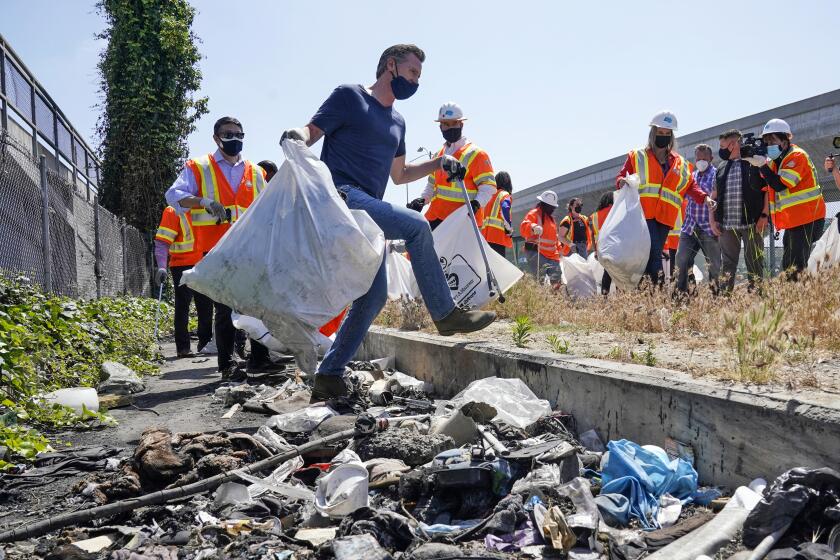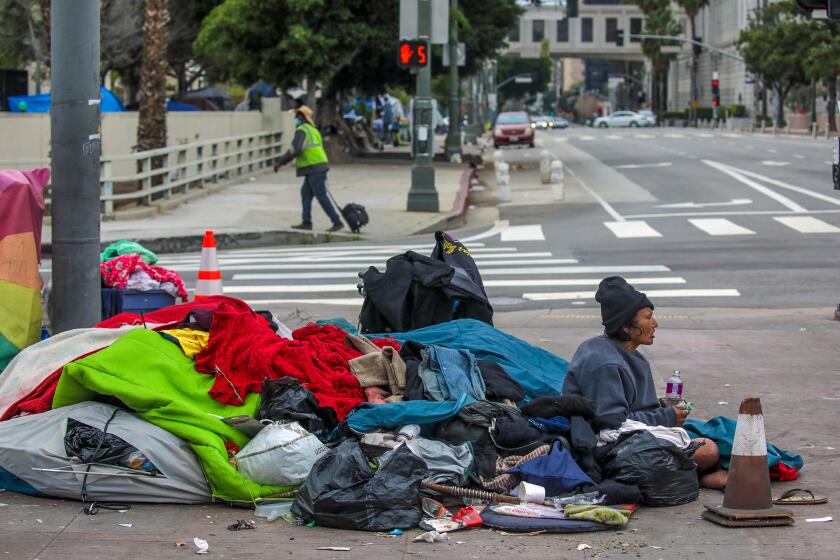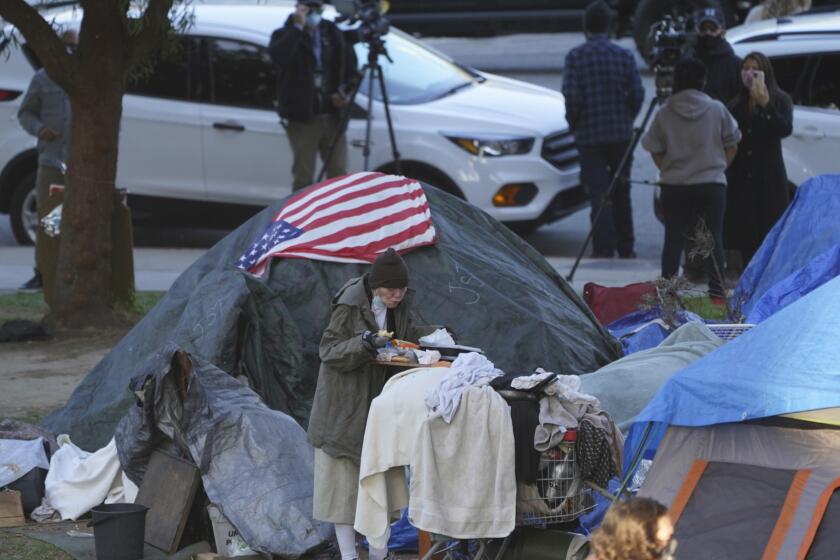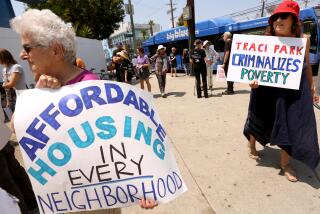Opposition mounts against Newsom’s plan for court-ordered treatment of homeless people
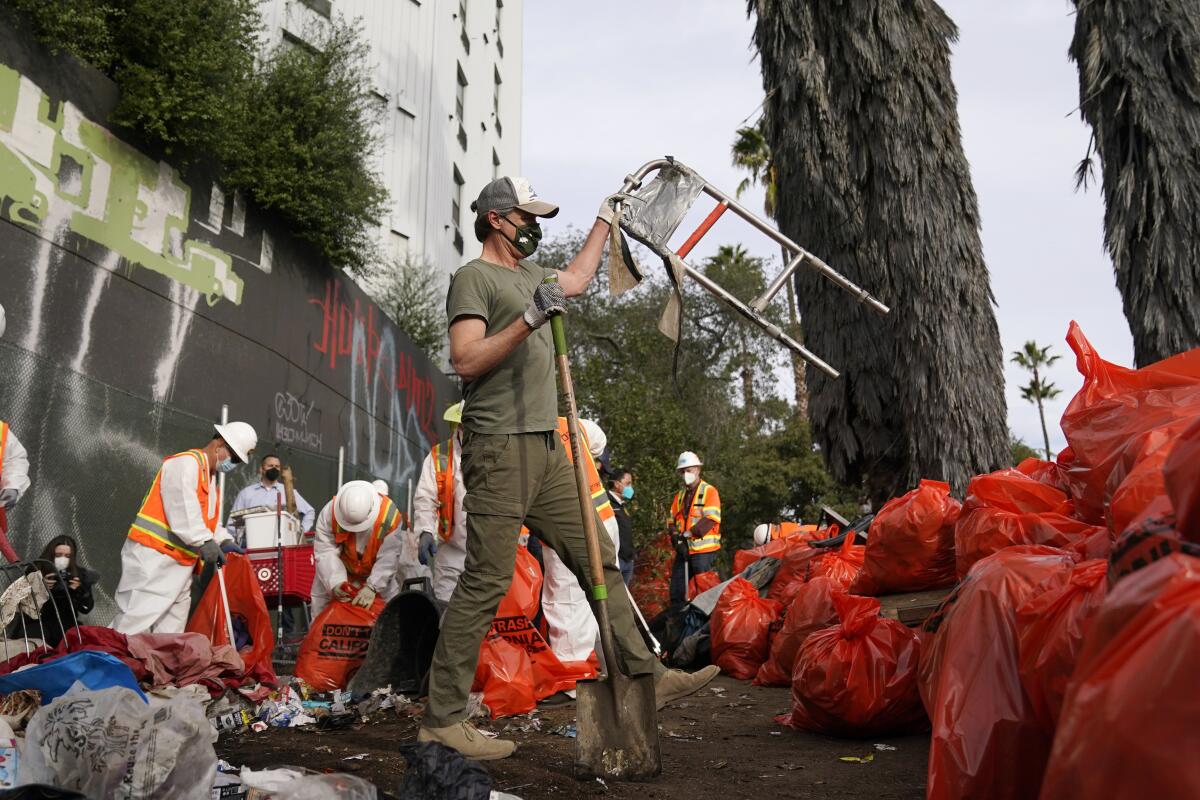
- Share via
SACRAMENTO — Six weeks after Gov. Gavin Newsom unveiled a far-reaching effort to push more people into court-ordered treatment for severe mental illness and addiction, homeless advocates are calling it legally misguided and immoral as the proposal’s first public hearing at the state Capitol has been delayed.
More than three dozen organizations and individuals, including the American Civil Liberties Union, Disability Rights California and the Western Center on Law and Poverty, signed an April 12 opposition letter raising serious concerns with Assembly Bill 2830, one of two nearly identical measures moving through the Legislature to implement Newsom’s Community Assistance, Recovery and Empowerment Court. The groups often have significant sway among liberal legislative Democrats, the kind of influence that could hinder Newsom’s hopes for a new law to be in place by July 1.
Newsom touted the CARE Court framework last month as an innovative strategy to guide an estimated 7,000 to 12,000 people into housing and much-needed treatment. Under the proposal, family members, behavioral health care providers and first responders, among others, could petition a civil judge to initiate a CARE plan for eligible individuals who lack medical decision-making capacity.
The governor said that CARE Court would focus on the most vulnerable Californians suffering from severe mental health conditions such as schizophrenia and individuals who have cycled in and out of hospitals and jails. The program would be voluntary and include assistance from both a public defender and a so-called supporter, a person who would serve as a personal guide through the recovery process.
California’s governor is fast-tracking a plan to compel people into court-ordered treatment, but a lot of details are still in question.
In their 14-page letter, the advocates blasted the proposal as involuntary and coercive treatment that would strip individuals of their personal liberties and “perpetuate institutional racism and worsen health disparities.” They said CARE Court “flies in the face of any evidence-based approach to ending homelessness” because it prioritizes mental health services — not housing — as the initial step toward recovery, which they said would deviate from California’s “housing first” principles.
And they argued the plan relies on a variety of concepts that are not clearly defined in the proposed legislation or in California law, which “will result in confusion and inconsistent application” of CARE Courts across the state.
“We believe that a transformational proposal like CARE Court should be thoroughly vetted by stakeholders and informed by research and data before it is adopted. That has not happened here,” the letter says. “Because CARE Court will harm Californians with disabilities, experiencing homelessness, and involved in the criminal legal system, we cannot support this proposal.”
Cynthia Castillo, a policy advocate for the Western Center on Law and Poverty, said Newsom’s plan “seems to be expanding the bureaucracy of homelessness services.”
“We are adding judges and attorneys into the mix in hopes of better connecting unhoused individuals with housing and medical care, but nothing else really changes,” she said.
Castillo said the anti-poverty group will remain opposed to the CARE Court framework unless lawmakers address the concerns outlined in the letter, especially the plan’s failure to address access to housing and its insistence on empowering judges to mandate care.
“We vehemently oppose the proposal because it has this coercive court process implemented, and no right to housing,” Castillo said.
Jason Elliott, Newsom’s top housing and homelessness advisor, said Monday that the administration expected some opposition to the proposal.
“We knew that a proposal this consequential, a proposal that aims to change the status quo so deeply, wasn’t going to be received unanimously, wasn’t going to be received with everyone clapping and cheering,” Elliott said. “To fundamentally alter the reality that we see on the streets requires us fundamentally altering our approach. We expected to have hard conversations with entrenched stakeholders.”
Gov. Newsom proposes plan to help homeless Californians with severe psychiatric, substance abuse and addiction issues get into housing and treatment.
No cost estimate for the plan has been released, but Newsom has pledged to spend up to $14 billion on solutions to California’s homelessness crisis over the next several years.
Newsom also attached accountability measures to the program, including sanctions for local governments that don’t comply with program requirements and diverting people into stricter conservatorships or letting their paused criminal cases continue if they fail to meet their CARE plan obligations. Mayors of some of the state’s most populous cities have endorsed the plan as a way to alleviate a humanitarian crisis in full display on their streets.
Elliott said that the governor “remains committed to the principles of housing first” and that CARE Court would be one of many ways a person could access shelter.
Newsom also proposed $1.5 billion in this year’s budget to boost California’s behavioral health housing stock and has funneled billions more toward housing options for people experiencing homelessness. The governor also has political incentives to quickly install CARE Courts. Voters have given Newsom poor reviews on efforts to stem the homelessness crisis, which is sure to come up in his opponents’ campaigns to block his reelection later this year.
But the advocates are concerned about more than the courts and housing.
They said they worry that CARE Court would disproportionately target people of color, who are more likely to be homeless and diagnosed with psychotic disorders, and that CARE Court would enable “unacceptable shortcuts” in the legal system that could remove bodily autonomy and medical decision-making power. And they want more clarity around the role of the supporter, who they said would serve more as court agents than personal advocates.
“CARE Court is not the appropriate tool for providing a path to wellness for Californians living with mental health disabilities who face homelessness, incarceration, hospitalization, conservatorship, and premature death,” the letter states. “Instead, California should invest in evidence-based practices that are proven to work and that will actually empower people living with mental health disabilities on their paths to recovery and allow them to retain full autonomy over their lives without the intrusion of a court.”
Andrew Imparato, executive director of Disability Rights California, said his group was open to working with the administration and lawmakers on changes.
After announcing the broad framework of his CARE Court plan, the real work begins for Gov. Gavin Newsom.
“If they start listening to us and really take coercive approaches and court-ordered approaches off the table, I think there’s more hope that we can work with them on something that we can all support,” Imparato said.
AB 2830 was originally scheduled to be heard this week by the Assembly Judiciary Committee, but the hearing is now set for next week, similar to plans for its companion measure, Senate Bill 1338.
But the bill may face a major hurdle once it’s heard in the Assembly Judiciary Committee. The panel’s chairman, Assembly Member Mark Stone (D-Scotts Valley), said in a statement that he shared “many of the concerns raised by the opponents about the CARE Court bills.”
And he warned against efforts to rush the bill through the legislative process without proper public input and scrutiny.
“I will be reviewing the legislation very closely and recommending any amendments necessary to ensure that CARE Courts can truly help those most in need, while not unduly limiting their constitutionally guaranteed rights,” he wrote.
State Sen. Susan Eggman, a Stockton Democrat and one of the authors of SB 1338, said she would modify the bill to address certain concerns before then, but “on some issues, we’re just going to have to agree to disagree.”
“It is a work in progress,” she said. “I’m not going to take anybody’s vote for granted, but I think with my caucus, and I think this is a bipartisan issue, everybody agrees that we need more tools in the toolbox in order to reach those who so desperately need our help.”
More to Read
Sign up for Essential California
The most important California stories and recommendations in your inbox every morning.
You may occasionally receive promotional content from the Los Angeles Times.
